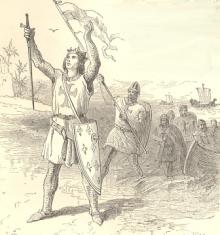Subsequent Crusades
The 5th to the 8th Crusades were largely unsuccessful, except for the 6th Crusade, which was very unusual and worth mentioning separately. The reason for lumping the 5th-8th Crusade in the same category was because after the 4th Crusade, the spirit of the Crusaders were beginning to wane. Failure after failure to capture Jerusalem weighed heavy on the consciences of the Crusaders, and the travesty of the Fourth Crusade only compounded that. The technology and wealth absorbed from the Islamic Empire also meant that the Europeans were becoming more interested in this newly-acquired body of knowledge than they were in Holy Wars. Nevertheless, the Fifth Crusade started in 1215. By the end of the 13th Century, the 8th Crusade had already come and gone, and there would be no more Crusades (there was, however, the Inquisition).
The 5th, 7th and 8th Crusades
Preparations for the 5th Crusades began almost immediately after the 4th Crusade, and in 1217 the Crusaders set out for their destination: not Jerusalem, but Egypt. Part of the reason was the wealth of the Egyptian Sultanate – Egypt for a long time was one of the major seats of power in the Islamic Empire. The Crusaders also hoped to use Egypt as a base to launch an attack on Jerusalem. However, while the Crusaders managed to take the port of Damietta after a long siege, they were prevented from advancing up the Nile when the Sultan of Egypt flooded the lower-plains of the river. Damietta was retaken in the same year, and the Crusaders returned home having achieved nothing.
The 7th (1249 AD) and 8th Crusades (1270 AD) were led by the same King, Louis IX, later canonised as Saint Louis. St Louis achieved nothing much, but he deserved the canonisation as he was one of the few Crusader kings respected by both sides. Both of his Crusades centered around Eygpt, and both times he was repulsed. In the 7th Crusade, he was captured after surrendering at the Battle of Mansourah after some initial success, and eventually ransomed. The 8th Crusade was equally ill-fated. The Crusade never made it to its destination – Louis was sidetracked by rumours of a Muslim king wishing to revert to Christianity, and ended up being stranded in Tunis with his Crusader army. There, plagued by typhus, dysentry and plague, Louis died. He was succeeded by his nephew Prince Edward of England, but that was the end of the 8th Crusade.
The Sixth Crusade
The 6th Crusade was unusual, as it was led by a Crusader King who didn’t behave like a Crusader: Frederick II of Germany (Barbarossa’s grandson). Frederick II proved that not all Crusaders believed in violence against Saracens – this one actually tried diplomacy. This is not all that surprising for the King of Germany – as Germany owned more land and riches than any other Crusading state at the time, and was in contact with some Islamic states.
Frederick II was supposed to set sail on the 5th Crusade, but fell ill with Malaria and was unable to catch up with the rest of the Crusaders. Pope Gregory IX, who never liked Frederick much anyway, promptly excommunicated him. However, this did not deter him, and in 1228 he set off with a Crusader force to Egypt. He was promptly excommunicated by Gregory IX a second time, for setting off without orders from the Pope – but judging from Frederick’s actions, he didn’t care much. He may well have been the first atheist Crusader. However, some of his Crusaders were troubled about their excommunicated status, and refused to leave; resulting in Frederick arriving in Crusader-held Acre with less a force than he originally had. This probably influenced his choices.
Instead, he entered into negotiations with the Sultan of Egypt, Al-Kamil, who knew Frederick personally anyway. Amazingly enough, Al-Kamil granted Frederick II the cities of Jerusalem, Bethlehem, and Nazareth; also the castles of Montfort and Toron, and a corridor running from Jerusalem to Jaffa. Thus, Frederick II crowned himself King of Jerusalem without even striking a blow. However, Jerusalem was very vulnerable as it was not won by waging war, and was in 1244 reclaimed by Muslim troops.
Despite Frederick’s success, all the Crusader states hated what he did. His actions were certainly maverick. They blamed the failure of the Fifth Crusade on him, and despised the fact that he negotiated with the Saracens instead of attacking them on sight (like a “real” Crusader would). I for one believe Frederick II was the greatest of all Crusader Kings – here was someone who believed in realpolitiks instead of religious fanaticism. I smile whenever I think of the way this particular Crusader King couldn’t give a damn about the religious pretensions of Europe at the time.
To Be Continued…

